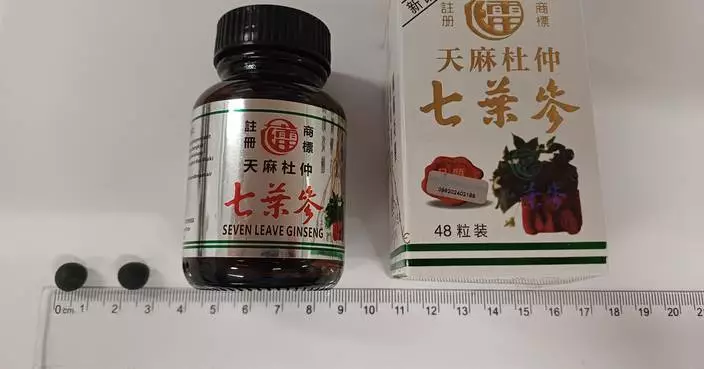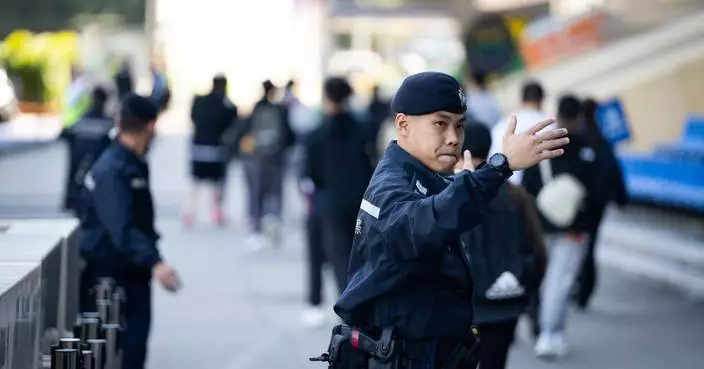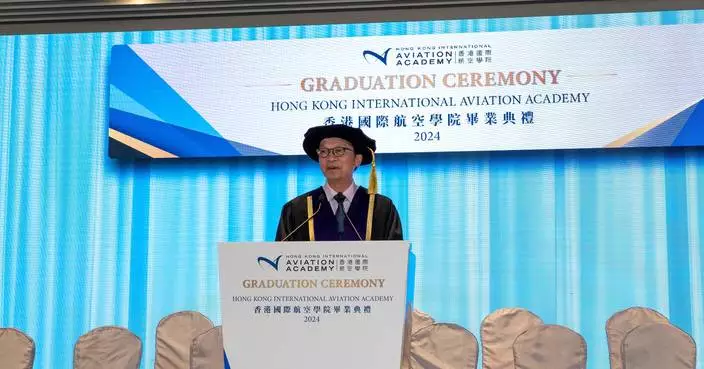Enterprise Participation in Northern Metropolis Development Event held today
The Hong Kong Special Administrative Region Government held the Enterprise Participation in Northern Metropolis Development Event today (November 29) to encourage local, Mainland and overseas enterprises to support and participate in the Northern Metropolis development. The Event received guidance from the Hong Kong and Macao Affairs Office of the State Council and was supported by the Liaison Office of the Central People's Government in the Hong Kong Special Administrative Region (LOCPG).
This morning, the Financial Secretary, Mr Paul Chan, led a delegation of enterprise representatives on a visit to the Hong Kong-Shenzhen Innovation and Technology Park in the Loop and the Hung Shui Kiu/Ha Tsuen New Development Area to understand their latest planning and developments, and to learn about the three large-scale land disposal pilot areas in the Northern Metropolis. The Government will openly invite enterprises next month to express their interest in the three large-scale land disposal pilot projects. The Government will finalise the tender terms after considering feedback from the market.
In the afternoon, the Chief Executive, Mr John Lee, hosted a luncheon at the Central Government Offices for enterprise representatives. This was followed by a signing ceremony attended by over 80 enterprise representatives. Witnessed by Mr Lee and the Director of the LOCPG, Mr Zheng Yanxiong, etc, a Memorandum of Understanding about supporting and participating in the Northern Metropolis development was signed. During the ceremony, 34 of the enterprise representatives also signed agreements among them to collaborate in the Northern Metropolis development, with a total investment of over $100 billion.
Speaking at the signing ceremony, Mr Lee remarked that as a new engine for Hong Kong's growth, the Northern Metropolis can complement the high-quality integration of Hong Kong with other cities in the Guangdong-Hong Kong-Macao Greater Bay Area, offering quality business opportunities for all. Mr Lee highlighted the Government's commitment to leading all sectors of the community and the market to participate in expediting the Northern Metropolis development. Mr Lee encouraged enterprises to actively participate in land development and other commercial, innovation and technology industry projects in the Northern Metropolis, including the new large-scale land disposal development approach, thereby delivering the visions of the Northern Metropolis project collectively in creating a bright future.
Representatives of the HKSAR Government attending the Event today also included the Deputy Financial Secretary, Mr Michael Wong; the Secretary for Constitutional and Mainland Affairs, Mr Erick Tsang Kwok-wai; the Secretary for Commerce and Economic Development, Mr Algernon Yau; the Secretary for Health, Professor Lo Chung-mau; the Secretary for Transport and Logistics, Mr Lam Sai-hung; the Secretary for Development, Ms Bernadette Linn; and the Secretary for Innovation, Technology and Industry, Professor Sun Dong.
CHP investigates case of Legionnaires' disease in United Christian Hospital
The Centre for Health Protection (CHP) of the Department of Health is today (November 29) investigating a case of Legionnaires' disease (LD) in United Christian Hospital (UCH).
The male patient, aged 75 with underlying illnesses, was first admitted to the UCH on October 5. After being transferred to Haven of Hope Hospital on October 9, he was re-admitted to UCH on November 12. He developed desaturation and pneumonia on November 23. His condition deteriorated and he eventually succumbed on November 25.
His sputum specimen tested positive for Legionella pneumophila serogroup 1 DNA upon laboratory testing. As the patient had been admitted to UCH throughout the incubation period, it was initially suspected to be a nosocomial infection.
"Epidemiological investigations with the UCH are ongoing to identify potential sources of infection, high-risk exposure and clusters, if any. Relevant water samples and environmental swabs have been collected from potential sources for laboratory testing," a spokesman for the CHP said.
The CHP and the UCH are working together in tracing contacts including staff and in-patients in the relevant ward, and those identified will be put under medical surveillance. The CHP has provided health advice against LD to staff and in-patients, including those with weakened immunity who should use sterile or boiled water for drinking, tooth brushing and mouth rinsing. The CHP has immediately requested suspension of affected outlets in the ward until installation of effective water filters against legionella at the concerned outlets. The water supply system of the subject ward will be disinfected urgently. The investigation is ongoing.
Legionellae are found in various environmental settings and grow well in warm water (20 to 45 degrees Celsius). They can be found in aqueous environments such as water tanks, hot and cold water systems, cooling towers, whirlpools and spas, water fountains and home apparatus which support breathing. People may become infected when they breathe in contaminated droplets (aerosols) and mist generated by artificial water systems, or when handling garden soil, compost and potting mixes.
Immunocompromised persons should:
Use sterile or boiled water for drinking, tooth brushing and mouth rinsing;
Avoid using humidifiers, or other mist- or aerosol-generating devices. A shower may also generate small aerosols; and
If using humidifiers, or other mist- or aerosol-generating devices, fill the water tank with only sterile or cooled freshly boiled water, and not water directly from the tap. Also, clean and maintain humidifiers/devices regularly according to manufacturers' instructions. Never leave stagnant water in a humidifier/device. Empty the water tank, wipe all surfaces dry, and change the water daily.
The public should observe the health advice below:
Observe personal hygiene;
Do not smoke and avoid alcohol consumption;
Strainers in water taps and shower heads should be inspected, cleaned, descaled and disinfected regularly or at a frequency recommended by the manufacturer;
If a fresh-water plumbing system is properly maintained, it is not necessary to install domestic water filters. Use of water filters is not encouraged as clogging occurs easily, which can promote growth of micro-organisms. In case water filters are used, the pore size should be 0.2 micrometres (µm) and the filter needs to be changed periodically according to the manufacturer's recommendations;
Drain and clean water tanks of buildings at least quarterly;
Drain or purge for at least one minute infrequently used water outlets (e.g. water taps, shower heads and hot water outlets) and stagnant points of the pipework weekly or before use;
Seek and follow doctors' professional advice regarding the use and maintenance of home respiratory devices and use only sterile water (not distilled or tap water) to clean and fill the reservoir. Clean and maintain the device regularly according to the manufacturer's instructions. After cleaning/disinfection, rinse the device with sterile water, cooled freshly boiled water or water filtered with 0.2 µm filters. Never leave stagnant water in the device. Empty the water tank, keep all surfaces dry, and change the water daily; and
When handling garden soil, compost and potting mixes:
Wear gloves and a face mask;
Water gardens and compost gently using low pressure;
Open composted potting mixes slowly and make sure the opening is directed away from the face;
Wet the soil to reduce dust when potting plants; and
Avoid working in poorly ventilated places such as enclosed greenhouses.
The public may visit the CHP'sLD page, theCode of Practice for Prevention of LDand theHousekeeping Guidelines for Cold and Hot Water Systems for Building Managementof the Prevention of LD Committee, and the CHP'srisk-based strategyfor prevention and control of LD.






